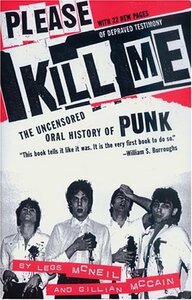Take a photo of a barcode or cover
Please Kill Me is absolutely wonderful. A brilliant oral history that tells the tale of the birth of NYC punk via the words of the people who lived (or didn't) through it. A raw, honest, uncensored, seedy, grim, unglamorous look at the personalities who formed the bands, who made the scene. There are gods and goddesses walking through the pages of this book, but we get to see their track marks, get to hear about their insecurities and jealousies. Punk music is a return to rock-and-roll basics; punk as a movement is a reaction against: hypocrisy, mediocrity, conformity. Punk rock is raw and primal and motivating and energizing; Please Kill Me captures that raw energy perfectly. I devoured this book; I adore this book. Highly recommended.
funny
informative
medium-paced
adventurous
challenging
dark
emotional
informative
reflective
sad
tense
slow-paced
Painful to read. But good, and interesting. A lot of ego. So much ego, it's really quite hilarious. So much sex and drugs. And so male-dominated. And yes, Lou Reed comes across as a huge asshole.
I enjoyed this book, more than I thought I would: growing up in the time before the internet, it was harder to piece together what punk was all about, just as it was very important, for some reason, to get it all straight. This book clears up a lot of the details, and does it in a pretty compelling, fun way, and also, at least in the first section, makes a convincing case for how gay the culture was, at least from VU through Iggy, and some distance past that.
The format, of stitching this together from interview fragments, like a transcript, was interesting but maybe a little cowardly-- letting the story about Sid and Nancy's last night stand unquestioned seemed a little disingenuous to me, for example, and some other stories-- those about Stiv Bator's death, or some other elements- seemed to be motre obscured by the format than helped, and of course, Legs and the founders of PUNK see a distinction between the Sex Pistols and the Ramones that I think isn't as clear as they make it out to be. But then, some of the totally off the wall, non-sequitor remarks included by Lou Reed almost make up for those other faults, just to try to imagine what Lou was trying to say (or to not say) on the way to saying what he did is pretty great.
Really, I think I want this to be one of three books just like it, assembled by people in slightly different locales-- I'd read a companion book on the Dictators, maybe, and definitely one centered on Suicide and their world, with a side of Eno. But maybe that's just me.
The format, of stitching this together from interview fragments, like a transcript, was interesting but maybe a little cowardly-- letting the story about Sid and Nancy's last night stand unquestioned seemed a little disingenuous to me, for example, and some other stories-- those about Stiv Bator's death, or some other elements- seemed to be motre obscured by the format than helped, and of course, Legs and the founders of PUNK see a distinction between the Sex Pistols and the Ramones that I think isn't as clear as they make it out to be. But then, some of the totally off the wall, non-sequitor remarks included by Lou Reed almost make up for those other faults, just to try to imagine what Lou was trying to say (or to not say) on the way to saying what he did is pretty great.
Really, I think I want this to be one of three books just like it, assembled by people in slightly different locales-- I'd read a companion book on the Dictators, maybe, and definitely one centered on Suicide and their world, with a side of Eno. But maybe that's just me.
Loved it. It's amazing that some of those interviewed survived the punk era, when so many didn't. Fast read, I found it to be entertaining, since I love punk music.
Just a great book! I would list this as an ultimate text of how to read and place America's punk scene within world history! Funny and vulgar and fascinating!
dark
emotional
funny
informative
inspiring
medium-paced
In the same style as Everybody Loves Our Town - this is a brilliantly compiled oral history. So much to learn. So much color and dimension. Why haven’t both of these books been turned into a docu-series?




